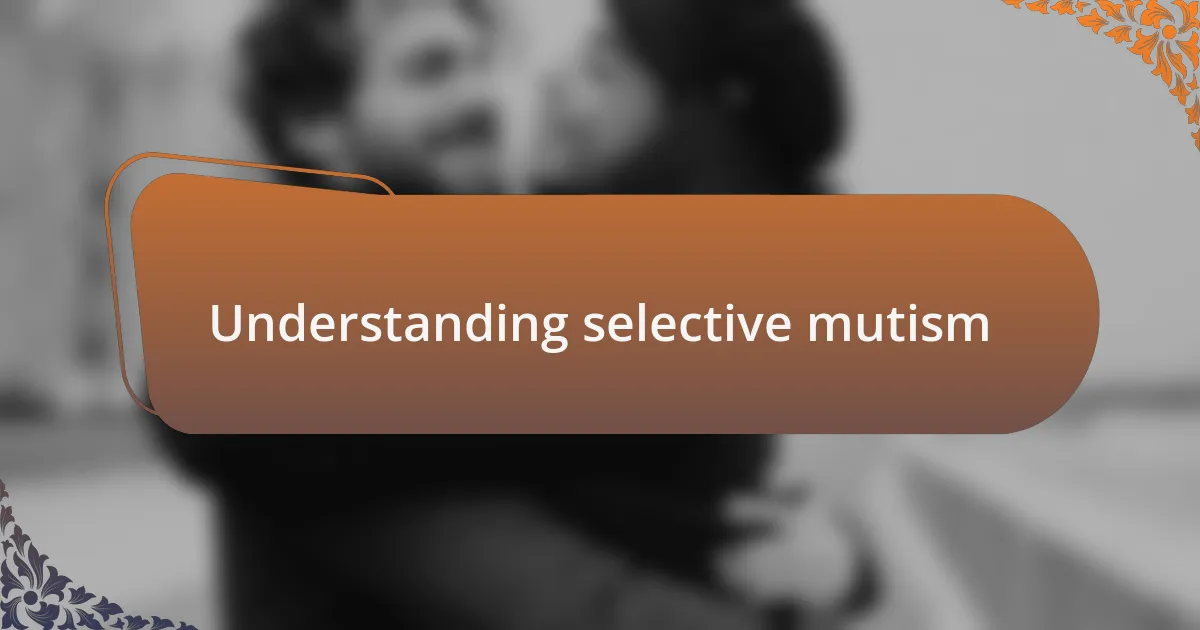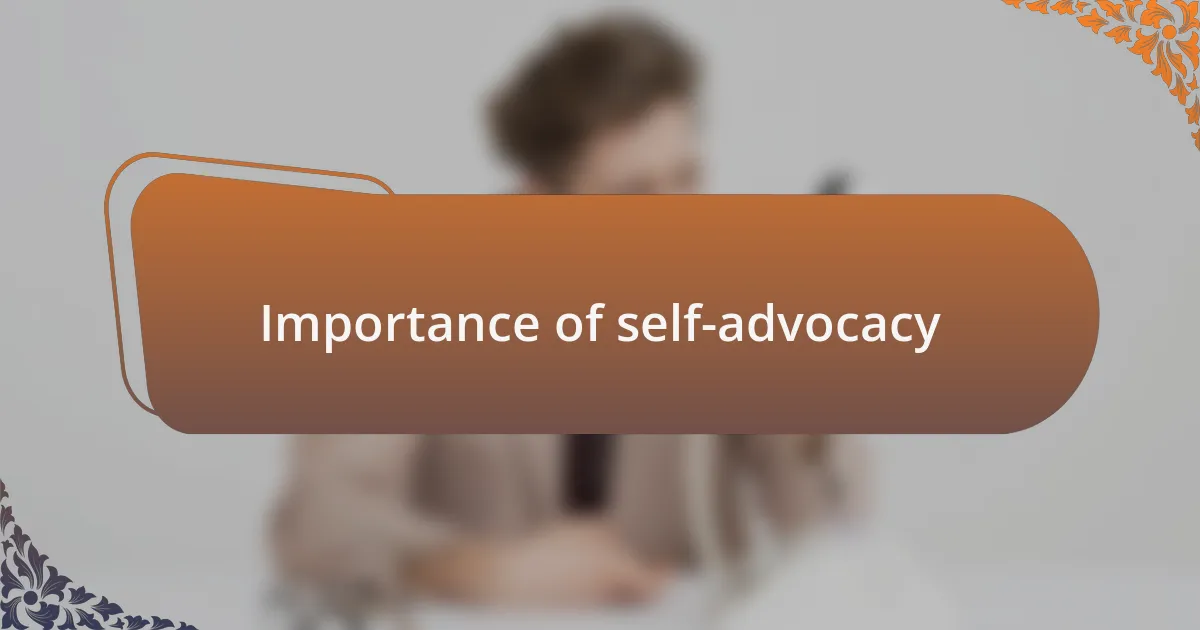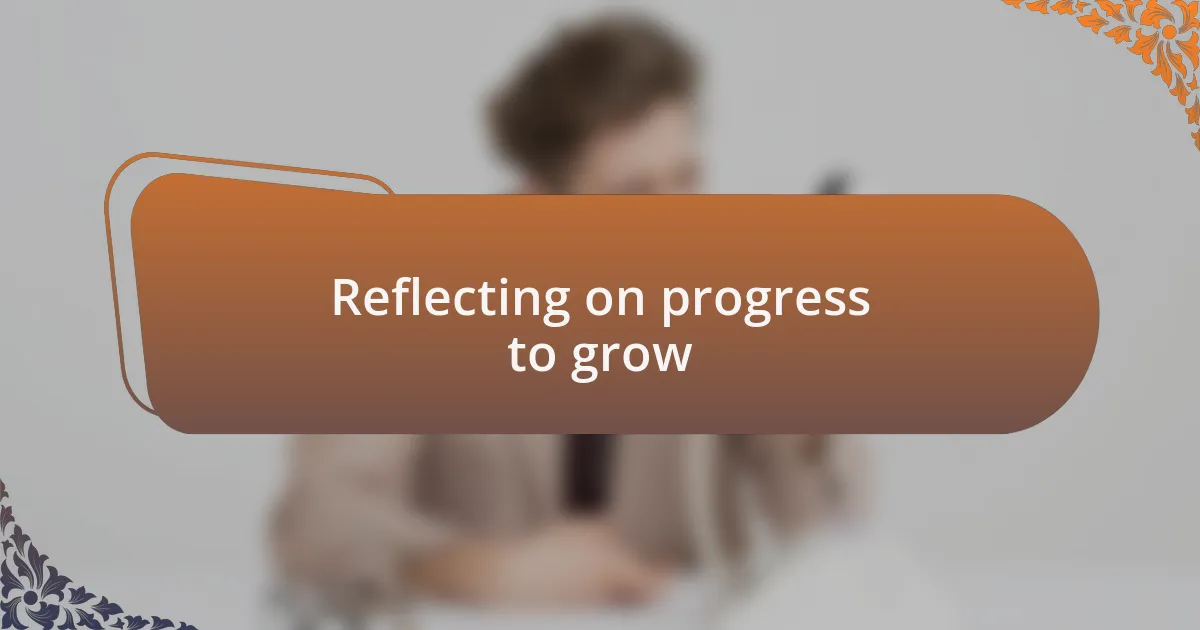Key takeaways:
- Selective mutism is an anxiety disorder affecting children’s ability to speak in certain social situations, despite their ability to communicate comfortably in other environments.
- Self-advocacy is crucial for individuals with selective mutism, empowering them to express their needs and build resilience.
- Building confidence to speak involves gradual practice, preparation, and creating low-pressure environments to encourage expression.
- Reflecting on progress and setting achievable speaking goals can enhance confidence and motivate continued improvement in communication skills.

Understanding selective mutism
Selective mutism is a complex anxiety disorder that primarily affects children, causing them to be unable to speak in certain social situations, even though they can communicate comfortably in other environments. I remember a friend’s child who was vibrant at home but transformed into a silent observer during school. This stark contrast made me wonder how many voices are stifled, trapped behind walls of anxiety.
The fear of evaluation often looms large for those with selective mutism, and it can stem from deep-rooted insecurities or past experiences. I’ve seen firsthand how a single comment—perhaps intended to be light-hearted—can echo in a child’s mind, embedding fear and leading to further silence. Isn’t it tragic that the very environment meant to foster growth can sometimes stifle expression instead?
Understanding selective mutism means recognizing that those affected desire to communicate but feel an immense barrier preventing them from doing so. Reflecting on my observations, I can’t help but feel empathy for children who want to join the conversation but find themselves unable to speak. What if we could create spaces where their voices are gently coaxed into the open?

Importance of self-advocacy
Self-advocacy is essential for individuals with selective mutism, as it empowers them to express their needs and seek support. I vividly remember speaking with a young girl who, despite her struggles, found the courage to share her feelings with a teacher. It was a small step, but witnessing her newfound confidence reinforced how crucial it is for those affected to advocate for themselves in their unique journeys.
When individuals learn to voice their struggles, it not only helps them navigate social situations more effectively but also fosters a deeper understanding among peers and educators. I often reflect on how my own willingness to share personal experiences allowed others to empathize and connect with me. Isn’t it fascinating how opening up, even a little, can create a ripple effect of understanding and support?
Moreover, self-advocacy cultivates resilience. I’ve watched as a child transitioned from silence to participation in group settings after learning to articulate her boundaries and desires. The simple act of asserting oneself can be transformative—don’t we all thrive when we’re encouraged to speak our truth and be heard?

Building confidence to speak
Building confidence to speak is a gradual process that often requires patience and practice. I recall a time when I felt utterly paralyzed during group discussions. It took numerous small victories—like sharing a single idea in a friendly setting—for me to realize that even my brief contributions held value. Isn’t it interesting how just one positive experience can spark a desire to speak more freely?
One effective method I’ve found is to prepare a few points or questions before entering a conversation. This approach not only alleviates anxiety but also boosts self-assurance. I remember attending a workshop where I jotted down discussion starters. When my turn came to speak, I felt more grounded knowing I had something to contribute. Have you ever noticed how being prepared can shift your mindset from apprehension to eagerness?
Role-playing can also be a game-changer. I often engaged in practice conversations with friends to mimic social scenarios. The first time I tried it, I stumbled over my words, but each attempt built my confidence. It’s truly enlightening how stepping out of our comfort zones, even in a safe space, helps us develop the courage to express ourselves actively in everyday life. What small step can you take today towards finding your voice?

Techniques to encourage speech
One technique that works wonders for me is using visuals or written notes to cue my thoughts during conversations. I remember once creating a small card with phrases I wanted to use in a family gathering. Having that card nearby eased my nerves and made me feel more connected to the conversation. Have you ever tried visual reminders to jog your memory?
Another approach I appreciate is engaging in low-pressure environments. I often visit local community centers or informal meetups where the focus is on sharing stories rather than performing. There was a time when I joined a storytelling group, and just listening intently helped me feel comfortable. Gradually, the warm atmosphere encouraged me to share my own stories. Isn’t it fascinating how a relaxed setting can transform how we express ourselves?
Additionally, positive self-talk plays a crucial role in my journey to encourage speech. I remind myself of past successes and the joy they brought. For instance, before speaking in a group, I often repeat mantras like, “My voice matters” or “Each word has the possibility of connecting with others.” How do you speak kindly to yourself before facing a challenging situation?

Setting personal speaking goals
When I set personal speaking goals, I make sure they are realistic and achievable. For example, I started with a simple goal: to share one thought during a team meeting each week. It felt incredibly rewarding when I realized that even small contributions could shift my comfort level, energizing my desire to speak more often. Have you noticed how little wins can build your confidence?
I also focus on goals that stretch my limits gradually. Last month, I decided to join a local debate club, which terrified me at first. But with each session, I aimed to contribute at least one point. Over time, facing that challenge not only improved my speaking skills, but it also helped me connect with others who share similar experiences. Isn’t it interesting how stepping out of our comfort zones can lead to unexpected growth?
Additionally, I find it helpful to write down my goals and track my progress. This becomes a visual reminder of my journey and serves as a tool for reflection. For instance, I keep a journal documenting each instance where I successfully spoke up, no matter how minor it felt at the time. Looking back on those entries reminds me of how far I’ve come and reinforces my commitment to continued improvement. What methods do you use to keep yourself accountable?

Practicing conversations in safe spaces
Practicing conversations in safe spaces has been a transformative step for me. For instance, I began having weekly chats with a close friend who understands my challenges. This informal setting allowed me to express my thoughts freely without the pressure of judgment, and I found that sharing little anecdotes from my day became easier over time. Have you ever noticed how comfort can foster confidence?
I also created opportunities in low-stakes environments, like family gatherings, where I initiated discussions about shared interests. I vividly remember the first time I described a book I recently read, feeling my heart race, yet, by the end, I was surprised by the positive feedback. Those moments reinforce the idea that we often underestimate our ability to connect meaningfully with others. How do you think sharing our experiences can help us feel more connected?
Moreover, I started utilizing supportive online communities where I could practice writing out conversations before speaking them aloud. This method not only alleviated some of my anxiety but also built my speaking skills in a supportive atmosphere. Reflecting on this, I can’t help but wonder if some of my best insights come when I feel safe among those who understand the journey of selective mutism. What nurturing spaces have you found in your own life?

Reflecting on progress to grow
Reflecting on my progress has been a vital part of my growth journey. I remember a time when even small interactions felt daunting. Now, as I look back on the milestones I’ve achieved, I realize that every effort to speak up, no matter how minor, has been a stepping stone towards increased confidence. Have you ever paused to acknowledge your small victories?
One moment that stands out was during a school project; I volunteered to present, despite my fears. Afterward, I took a moment to reflect on how I managed that, and it struck me how much I had grown. I felt a wave of gratitude for the support I received from my classmates—this reminded me that growth often comes from recognizing the contributions of others in our journey. Isn’t it fascinating how our progress can be interwoven with the people around us?
Daily reflections have also become a personal ritual for me. I find it helpful to jot down what went well and what could be improved after each attempt to engage in conversation. This practice not only helps me identify patterns in my behavior but also encourages me to appreciate the progress I sometimes take for granted. How often do you remind yourself of how far you’ve come?